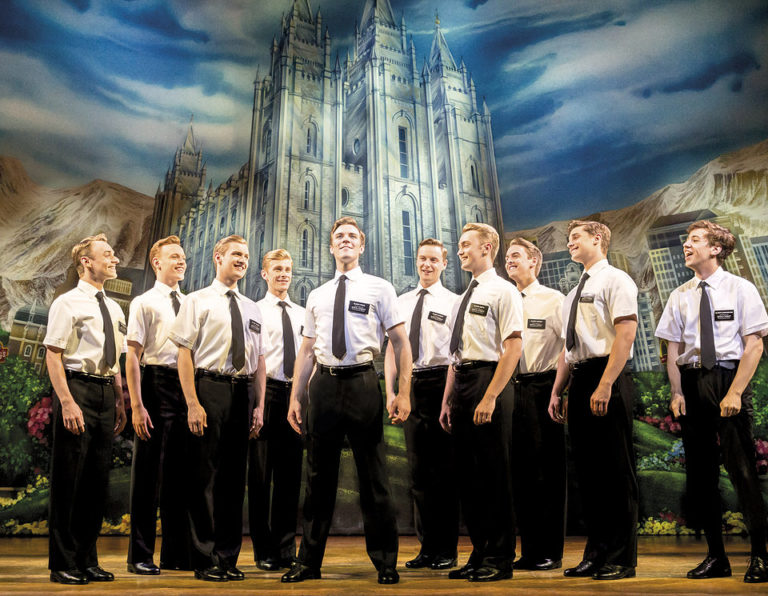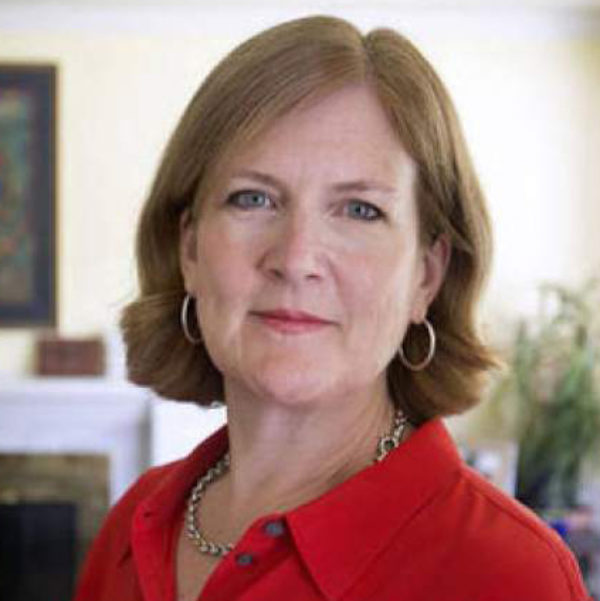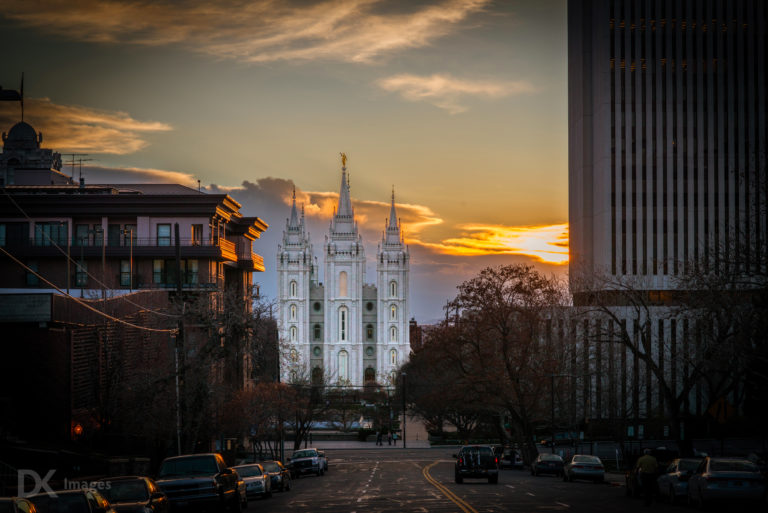
Image by Joan Marcus.
Nothing Sacred: Satire Comes to Salt Lake City
Even as a faithful Mormon I have to admit that the South Park portrayals of Latter-Day Saints over the years haven’t been all bad. In an odd way, I was honored that the Mormon prophet Joseph Smith was numbered among the “Super Best Friends” in a couple of episodes, representing — for good and ill — all the world’s religions. But when Trey Parker and Matt Stone announced the production of a Broadway musical mocking Mormons exclusively, I rolled my eyes.
LDS folk make an easy target for satirists; we are a peculiar blend of American middle class respectability and apparently oddball belief. Devoting two hours at the Eugene O’Neill Theater in New York City to denigrating a minority religion that is still marginalized by the media seemed, well, lacking in courage. Four years later, when The Book of Mormon touring company announced a Salt Lake premiere, I was intrigued.
Here in the heart of Mormon country — where the LDS church has its worldwide headquarters, where Mormons hold 80 percent of the seats in the state legislature, where two LDS meetinghouses sometimes stand on the same city block — this is where the show could serve the age-old purpose of satire: to challenge the existing power structure. Although still wary of Parker and Stone’s anti-religious propaganda, I sensed the value of such an event for the non-Mormon, anti-Mormon, and post-Mormon audiences in Utah. What was beating up on the little guy in New York could be parodying the oppressor in Salt Lake; and maybe, I figured, that would be a healthy thing.
But there was another, deeper reason that I paid scalper’s prices for an opening night ticket. I wanted to feel what it was like to be mocked.

It might be valuable to be on the receiving end of the free speech and boundless self-expression that we celebrate in Western democracies. While I am prepared to defend anyone’s right to offend me (in this case I paid them for their services), I think more attention needs to be paid to the human consequences of that offensive act. How does it feel to have the things you hold sacred defamed and debauched in front of hundreds of eager onlookers?
I was horrified by the murder of the Charlie Hebdo cartoonists, but that was only half the story. What about the devout and decent Muslim minorities in Europe and the United States who suffer in silence with no thought of revenge when their prophet and holy texts are publicly derided? What is the cost of such suffering? In a masochistic way I wanted more insight into it. How are conservative people of faith supposed to live in a world that values meta-remove and cynicism over authentic spiritual experience?
So I took my seat in the comfort of the Capitol Theater on Main Street in Salt Lake, waiting to have Broadway’s finest sing out their f-bombs and dance their way all over my religion.
As the curtain went up to reveal those adorably dorky young missionaries-in-training with Books of Mormon in their hands standing in front of the Salt Lake Temple (the real one was only four blocks away), the cheering almost drowned out the music for a moment. It was a strange mixture of hometown pride, and relief that Yes! Finally someone on the outside understands what we have to put up with around here! I was cheering too, but for a slightly different reason; even as comedic caricatures, these boys on stage represented the people I love: my family, my friends, my tribe.

The fact that our sacred story is not shrouded in the mists of history has been very convenient to Mormonism’s detractors. No one has found Moses’ journal as he lead the Israelites to the Promised Land; the historical Jesus is elusive at best. Centuries of tradition and political power have given Judeo-Christian religions a certain respectability that, while no longer ubiquitous, certainly persists in many quarters.
Mormonism is Christian to its core, but we arrived on the scene way too late to make it into the club. The unique facets of our faith — a farm boy visited by Deity, Christ ministering to ancient Jews on the American continent, the potential each individual has to become like God — these claims sound outlandish to old school believers even though they are no different in scope or character from the tenets of any other religious tradition.
Furthermore, since our faith was established in 1830, the detailed and documented lives of the Mormon founding fathers are always within reach. Our prophet Joseph Smith is a flesh and blood historical figure. Along with his spiritual teachings, there is plenty of evidence revealing all the flaws, embarrassments, and contradictions a satirist could want. This is why Mormonism is such a perfect vehicle for Parker and Stone. They can use the public’s perception of LDS beliefs as preposterous to lead them to the conclusion that all religious faith is absurd.
It’s an alternately dark and hilarious road we travel with the missionaries in the musical. Every effort of these faithful but clueless boys to find converts is thwarted by the horrific conditions that are daily life in an impoverished and war torn Ugandan village. (And, by the way, has anyone asked Ugandans how they feel about this show? Colonial stereotyping seemed alive and well to me.) The juxtaposition of perky Mormon optimism with bitter hopelessness is, I have to say, managed masterfully with superb comic timing and the shock value that results from the plentiful use of obscenity. “Turn it Off” is an apt send-up of the Mormon cultural tendency to repress pain.
Every single reference to and re-enactment of Mormonism’s beliefs and sacred stories is derisive. Joseph Smith is a vain airhead — pulling one over on his followers with a dubious tale about gold plates. Jesus is a wooden, self-satisfied know-it-all. On the one hand I get it. The way my church presents these stories in our visitors centers and miracle pageants is out of date and one-dimensional, but portraying the Mormons as idiots when they turn to God, when they speak His name in prayer, that hurt. It made the world an uglier place for me. It felt like an attempt to cheapen my spiritual experiences, to cut me off from the transcendent. It got old pretty fast.
Late in the second act, the show took a surprising turn. Self-absorbed Elder Price hits bottom and has to dig deep to find the conviction to keep going. Songwriter Robert Lopez has beautifully crafted a classic number where Price opens his heart in a time of immense need. He belts out what Mormons call a testimony — what he knows is true in this life and the next. Given the way the missionaries have been portrayed up to now in the show, we sit back, ready to smirk.
As he revs up to the stirring refrain of “I Believe” something has changed. For the first time all night, there is a sense of the enormity of what his faith means to him. He’s speaking from the heart. He’s reaching for that thing that’s bigger than he is to help him in his pain:
I believe that the Lord God created the universe
I believe that He sent His only Son to die for my sins
What? Time stood still; you could feel the audience in awe and confusion. Something was real here, something powerful. But wait… that’s not supposed to happen in this show.
We were experiencing what people who convert to Mormonism report. This is what we call the Spirit bearing witness. This is the story that my son, my nephews, my former students — young men and women who served missions — tell in their weekly emails home to friends and family:
“I let go of my fear and just shared what I know in my heart is true… I asked Heavenly Father to give me courage… I felt divinely prompted to knock on one more door that night.”
For a few seconds, as far as I was concerned, Trey and Matt got it absolutely right.
They could not allow that to stand. And to be fair, no satirist worth his salt would. Sincerity, it can render the weapons of cynicism and irony useless.
After this brush with authenticity, Elder Price’s testimony is quickly reframed as sweet but deluded. We are again reminded of the goofy-sounding details that live on the periphery of LDS belief: the whereabouts of the Garden of Eden, God’s precise location in the universe. Relieved laughter from the audience resumed. That uncomfortable moment where people who’d come for farce were faced with something serious, true, and beautiful, was, brilliantly I’ll admit, punctured by the return to cynical condescension.

Things only get worse from there. Elder Price’s reward for baring his soul is sexual assault. There were a few gasps from the Salt Lake audience when this plot turn was revealed, but it was followed by laughter. In some twisted way this was the writers’ ultimate achievement. Congratulations guys, you made a brutal rape comedic, and it’s okay because the weapon was literally Mormon scripture and the victim a dumb missionary. Yes, this is make-believe. Yes, this is parody. Yes, I can take a joke, but at that point in the show, the audience was as complicit as the goons that guard the Ugandan warlord. We laugh at the cruelty; Elder Price is no longer a human being. We have entered the realm of bigotry. Behold the power of theater.
Observers have praised the upbeat finale as a generous atheist’s nod to the good religion does. The missionary companions have concluded that although religion is based on lies, it can help people be happy right now. If that’s the only compliment I’m going to get out of this musical I’ll take it, but to many religious people that attitude discounts the work we do every day to cultivate faith, to live with doubt, to wrestle with the idea of putting off happiness now in obedience to a higher law. Even if you are not a literal interpreter of scripture your sacred stories are sacred metaphors that if dragged through the mud lose the power to help, to heal, to console.
I’m not declaring a war on satire. The Western tradition of using parody and sarcasm to shame individuals, governments, or society into improvement is a noble one. And I’m not saying my church as an institution ought to be exempt from such treatment; it was probably healthy for the LDS power structure to have to take it on the chin on their own turf. But ridiculing another human being’s profound spiritual experience is a shabby undertaking. It is, as cartoonist Gary Trudeau has said, the abuse of satire:
“At some point free expression absolutism becomes childish and unserious. It becomes its own kind of fanaticism.”
Just because we can say something doesn’t mean we should. If a satirist chooses to ridicule an already marginalized group he is now in a position of privilege that can contribute to a dangerous unawareness of how his unbridled speech can degrade the humanity of his targets. The consequence of that abuse of power is that those targets start to see themselves as victims and become vulnerable to demagogues who preach retribution. Hate breaks out all over.
In the the text of the actual Book of Mormon, Lehi, an ancient prophet, describes a dream that is a symbolic telling of life’s journey. He sees valiant souls walking through difficulty and darkness, eventually finding a straight path to the Tree of Life that bears delicious fruit. The tree, he explains, is the love of God, and he wants others to join him and share this happiness. He looks up, and across the way is a “great and spacious building” where detractors have gathered:
“And it was filled with people… and their manner of dress was exceedingly fine; and they were in the attitude of mocking and pointing their fingers towards those who had come and were partaking of the fruit. And after they had tasted of the fruit they were ashamed because of those that were scoffing at them; and they fell away into forbidden paths and were lost.”
My evening at the theater was an unlikely fulfillment of Mormon scripture. It would be dishonest to say that I was not, at times, among the scoffers, but more often I felt it was me they were pointing at. Yet I emerged unashamed; persecution has been part of my tribe’s story for a long time, and although there are plenty of reasons to wander from the path on my faith journey, clever mockery is not one of them.
I’m glad I went to the show. It’s important to see how others perceive you, even if it is through a distorted lens.

Bless your hearts, Parker, Stone, and Lopez. You are now pillars of the Church of American Musical Theater. “The Book of Mormon” is bursting with loving references to that tradition. You have been compared to Rogers and Hammerstein. I saw groundbreaking creativity on display, but no engagement with improving the human condition, the foundation of powerful satire.
The production was another sad skirmish in the culture wars, isolating Mormons instead of bringing them, and other conservative people of faith, into the conversation. While the giants of the Broadway musical used this medium to expose bigotry, you have given intolerance a whole new life — drumming it into the dear little ears of worldwide audiences six nights a week. Bravo.


Share your reflection